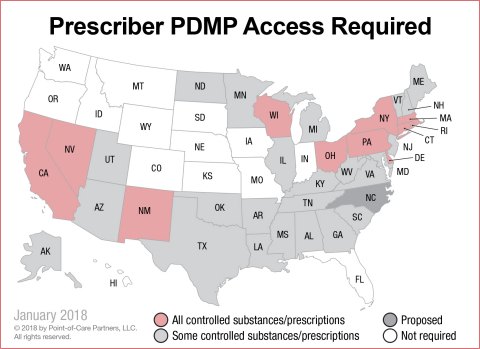CORAL SPRINGS, Fla.--(BUSINESS WIRE)--States are fighting back against the opioid epidemic through legislation that hits the problem at its root cause: opioid prescribing. In the last year, legislation and regulations affecting opioid prescribing have nearly tripled, with states hardest hit by opioid deaths among the most active in implementing new mandates, according to a new report from Point-of-Care Partners.
A new, first-of-its-kind report, Fighting the Opioid Epidemic at the State- and Rx-Level, explains overarching trends across the states on opioid prescribing and provides the latest summary details on a state-by-state basis. Analyses are organized around prescribing, preventing fraud and abuse and preventing and treating addiction. Two appendices provide a state-by-state view of legislation and regulations implemented across states, while the figures highlight key proposed legislation such as electronic prescribing for controlled substances (EPCS).
Unlike other reports in the marketplace, POCP’s new analysis is based on the most up-to-date information (as of January 2018) and is designed to help stakeholders understand the details and complexities of how states are handling opioid prescriptions. Companies tracking state opioid prescribing activities will find this report valuable, as well as organizations and individuals working to combat the opioid crisis. Consultants, investors, patient advocates, technology companies, payers and providers will also benefit from this in-depth analysis.
Of the top five states with the highest-observed drug overdose death rates in 2016, Ohio and Pennsylvania have each implemented or proposed the most measures to address drug overdose deaths in their states.
Currently, there are eleven different measures in play, of which most states have legislated or proposed at least several. These are described in detail in the report and include:
- Requiring prescribers to consult Prescription Drug Monitoring Programs before prescribing
- Requiring prescribers to submit controlled substance prescriptions electronically via electronic prescribing for controlled substances
- Limiting fill quantities and who can prescribe opioids and Schedule II narcotics
- Requiring additional data, such as diagnosis, on the prescription
"State efforts are not static or consistent but a clear understanding of the trends and approaches being employed across states can help inform future federal or state efforts and prepare stakeholders for mandates that change provider workflow," said Connie Sinclair, RPh, Director of Point-of-Care Partners’ (POCP) Regulatory Resource Center and lead author. “In addition, these checks and balances will ultimately reduce the toll of the opioid epidemic on lives and states across the country.”
Point-of-Care Partners’ CEO Tony Schueth adds, “A second report that will come out in Spring 2018 will analyze the critical role of electronic health records (EHRs) and other health IT stakeholders in facilitating prescriber compliance with mandated changes in prescribing.”
For more information about Fighting the Opioid Epidemic at the State- and Rx-Level, or other insights available from Point-of-Care Partners, click here. Direct inquiries for purchase should be addressed to Jeanette Nelson at jeanette.nelson@pocp.com.
About Point-of-Care Partners
Point-of-Care Partners is a health IT management consulting firm with in-depth expertise in ePrescribing, eMedication management, health information exchange, population health management and multi-stakeholder initiatives. To learn more about our Regulatory Resource Center offerings, visit www.pocp.com/regulatory-resource-center or email resources@pocp.com.
Related Links:




